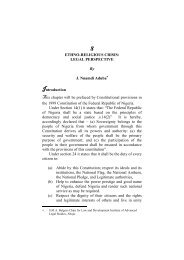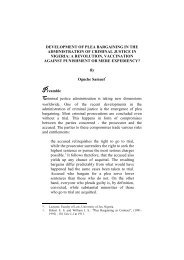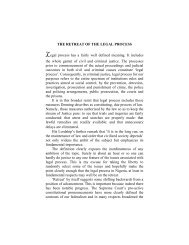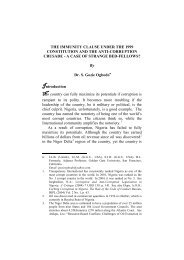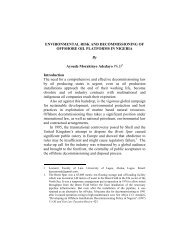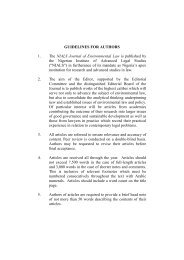9 - The Nigerian Institute of Advanced Legal Studies
9 - The Nigerian Institute of Advanced Legal Studies
9 - The Nigerian Institute of Advanced Legal Studies
Create successful ePaper yourself
Turn your PDF publications into a flip-book with our unique Google optimized e-Paper software.
290<br />
Law and Security in Nigeria<br />
discourse from the hypothesis that where those factors are<br />
absent, the intention to perpetrate acts <strong>of</strong> criminality and<br />
violence would also not materialise.<br />
<strong>The</strong> primary causes <strong>of</strong> crime and conflicts in Nigeria,<br />
going by available literature on the subject, are rooted in the<br />
inept structural forms which create and sustain human<br />
insecurity in its broadest sense, including deprivation <strong>of</strong><br />
social and economic rights. 119 <strong>The</strong>se factors are complex and<br />
cannot be expatiated in this discourse. All the same, they are<br />
relevant in their collective capacity as an indirect stimulant <strong>of</strong><br />
the demand for small arms. <strong>The</strong>y include high levels <strong>of</strong><br />
unemployment among the teeming population <strong>of</strong> youths and<br />
the working class age, inequality in the distribution <strong>of</strong><br />
income and privileges <strong>of</strong> governance, low level <strong>of</strong><br />
infrastructural and economic development, lack <strong>of</strong> social<br />
amenities, poverty, corruption, pr<strong>of</strong>ligacy, declining moral<br />
standards, lack <strong>of</strong> good governance, neglect <strong>of</strong> the minority<br />
especially the Niger Delta, among others. 120<br />
<strong>The</strong> unemployment factor is specifically identified as an<br />
important dynamic in the armed-conflict cum small arms<br />
challenge. Ginifer and Ismail underscored the nexus between<br />
the two phenomena in their study, noting that political<br />
violence “percolates the entire <strong>Nigerian</strong> State where political<br />
elites mobilise the pool <strong>of</strong> unemployed youths, <strong>of</strong>ten along<br />
ethnic, religious and party affiliations, as a vital political<br />
119. See Ifedayo Adebayo: “We’re Failed State No. 14”, Next News Alert, at:<br />
http://234next.com/csp/cms/sites/Next/Home/5591733-<br />
146/were_failed_state_number_14.csp, citing the current 2010 failed State<br />
index report released by Peace Fund and published in Foreign Policy<br />
Magazine, which listed Nigeria among countries like Sudan and<br />
Zimbabwe as failed States. A State is deemed to have failed when the<br />
government <strong>of</strong> such a State is unable to perform the basic responsibilities<br />
<strong>of</strong> a sovereign State such as providing security, rendering <strong>of</strong> social<br />
services and protecting the human rights <strong>of</strong> its inhabitants.<br />
120. Hazen and Horner: op cit, pp 22-23; Human Rights Watch “<strong>The</strong> Warri<br />
Crisis”, op cit, pp 24 - 25. See also Ginifer and Ismail, op cit.



